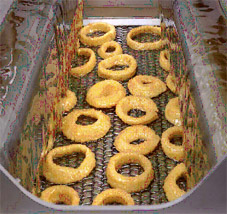 OIL used in frying is an integral part of food processing and there are various steps that an operator can undertake to improve oil quality and increase oil life while improving output and reducing losses or wastage. There is no single method for enhancing oil integrity and your approach should address multiple factors. Five key areas for increasing oil life and maintaining quality are choice of oil, oil stability, oil and fryer match, effective frying techniques and oil storage and handling.
OIL used in frying is an integral part of food processing and there are various steps that an operator can undertake to improve oil quality and increase oil life while improving output and reducing losses or wastage. There is no single method for enhancing oil integrity and your approach should address multiple factors. Five key areas for increasing oil life and maintaining quality are choice of oil, oil stability, oil and fryer match, effective frying techniques and oil storage and handling. Choice of Oil
"What is the best oil for the job?" Such a question often arises, and "it depends" always seems to be the appropriate reply. The selection of the most suitable oil for your needs is nearly always a compromise of areas such as continued oil availability, consumer acceptance, processing needs, product characteristics, environmental needs, machinery suitability and the impact of the end product cost. These factors, plus others depending on individual situations, should be considered during the selection of this most important ingredient and help guide your oil decision-making process. When deciding what oil type is required, the "absolute minimum" quality of oil that will be used in the frying system should be established. Ensure that the oil delivered actually does meet your specified benchmark. The choice of unsaturated oils is a little more complex. Traditionally saturated fats (oils) have delivered a relatively stable and viable frying environment but as consumers increasingly choose unsaturated oils in their foods and food producers meet demand, the problems related to the frying process of unsaturated oils are more prevalent and are more likely to affect the final product. Incorrect management of unsaturated oils can lead to reduced product shelf life, increased oil wastage and increased processing costs and market losses. To offset these problems when using unsaturated oils, the recommended operating environment offered by your frying systems should influence the selection of the most suitable oil.
The choice of unsaturated oils is a little more complex. Traditionally saturated fats (oils) have delivered a relatively stable and viable frying environment but as consumers increasingly choose unsaturated oils in their foods and food producers meet demand, the problems related to the frying process of unsaturated oils are more prevalent and are more likely to affect the final product. Incorrect management of unsaturated oils can lead to reduced product shelf life, increased oil wastage and increased processing costs and market losses. To offset these problems when using unsaturated oils, the recommended operating environment offered by your frying systems should influence the selection of the most suitable oil. Oil stability and spoilage
You get out what you put in so start with quality oil as nothing can compensate for an inferior raw material. Further, the refining process and subsequent storage practices can affect how far your oil will go. Within frying oils are compounds called anti-oxidants which help strengthen the oil against oxidation. The level of anti-oxidants can vary with different types of oils as well as different batches. Generally, the higher the level of anti-oxidants present in the oil, the stronger the oil is against oxidation. Stronger oils are sometimes referred to as having more "stable" properties. Natural anti-oxidants, Tocopherols for example, are the best form and are naturally found in oils; however the addition of artificial anti-oxidants to the raw material by some oil suppliers is used to further strengthen some oils. Additives, such as chelating agents can further strengthen the oil but this needs to be added at very specific doses and correctly handled. Other types of oil additives commonly used in the frying process act as a barrier to oxygen and oxidation with some forming a very thin layer on top of the oil thereby protecting the oil from the oxygen within the air and so delaying the onset of oil oxidation. The use of artificial anti-oxidants and other additives will depend on market, processing and regulatory factors and will vary according to differing situations. The act of choosing additives should be undertaken carefully for specific frying situations. There are several ways for oil to spoil but three stand out: Oxidation.When oils are heated to elevated temperatures and in the presence of oxygen, they may undergo oxidation and form hydro peroxides. These peroxides aNike Hyperdunk 2017













